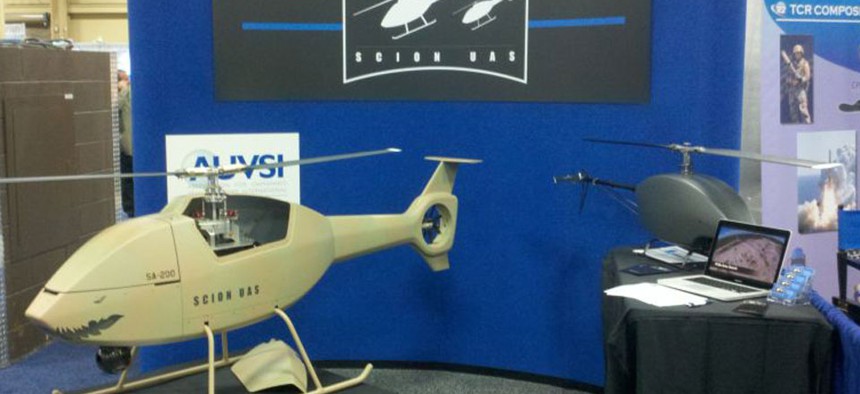Can Drones Be Known for More Than Causing Death?

Scion UAS's SA-200 Weasel, left, and SA-100 Mink on display. Scion UAS
Some can do search, rescue, and recovery operations—and pizza delivery.
"Whatever you write, please don't call it a drone," Steen Mogensen says, gently touching the tail of a 19-foot orange-and-white helicopter. Mogensen, the CEO of Scion UAS, didn't mean to say that this vehicle can't fly without a pilot—of course it can. This is the unmanned-vehicles convention in Washington. It's the terminology he takes issue with.
"It just strikes fear into a lot of people," says Mogensen, who with his soft Danish accent and slight potbelly is himself decidedly not scary. Even when talking about the more controversial aspects of unmanned aircraft, he manages to take the edge off with a touch of folksiness: "If you fear they will fly overhead and take a picture of your wife in a swimming pool, just remember that your neighbor can put his iPhone on a stick and do the same thing." (Of course, an iPhone can't hover hundreds of feet in the air for hours on end and be controlled from a remote location.)
Other than the fact that this craft—nicknamed "The Jackal"—can be operated from the ground, it has very little in common with the Predator drones delivering the Hellfire missiles made famous by the evening news and Homeland. Americans are well familiar with the fact that weaponized drones have been used to kill Qaida operatives (and civilians as well) throughout Pakistan and other areas, and that the government has the ability to target an insurgent's cell phone. But, with a seat in the cockpit and the ability to carry more than 200 pounds, The Jackal is designed more to save lives than it is to take them.
"The perfect example would be the Arizona fire that killed 19 firefighters," he said. "If it were allowed, it could have potentially been used to fly in and pick up people one at a time, without risking the life of a helicopter pilot. Unfortunately, the FAA doesn't allow it. It would have been criminal just to try."
The Washington Convention Center this week is filled with hundreds of companies somehow involved with unmanned vehicles. They have intimidating names such as Falcon UAV, Battlespace Flight Services, Robotex, and … North Dakota. Their booths are adorned with wartime images and videos of black-and-white surveillance footage. It's big business for the military. But for it to be big business in the private sector, there's going to need to be a softer sell.
These days, the public opinion of drones is so bad among some people that a small town in Colorado may soon allow them to be hunted down. This month, Deer Trail, a town of about 500 people, will be voting on a proposed ordinance to sell drone-hunting licenses. For $25, citizens will be able to shoot down unmanned vehicles that resemble a federal drone. Success will yield them not only a dead drone to mount but also a $100 prize, and the chance to possibly be prosecuted by the feds.
Chris Miser of Falcon UAV took one of his small unmanned vehicles to Deer Trail earlier this month to demonstrate that they aren't all bad.
"Part of it was just to show them they can't stop me," he said. "But part of it was to show them how beneficial unmanned aircraft can be for them." Sure, drones can be used for spying, but they can also be used for cattle counts or accurately mapping acreage lost to a storm so farmers can get paid their insurance, he said.
In this sense, hating on drones is kind of silly: Do Americans have the same disgust for airplanes just because a few of them are used for dropping bombs? Do they hate computers just because some of them are used for conducting cyberwarfare?
In reality, Americans seem to be pretty OK with drones. A poll conducted by Pew in March found that 65 percent of the country supported drone strikes of non-U.S. citizens suspected of terrorism. That number certainly skyrockets when the drones are used in search-and-rescue missions, to check out the damage of natural disasters, or to, say, deliver pizzas.
William Harvey, CEO of the vaguely named Brandebury Tool Co., says he has been working on drones for 30 years and is used to dealing with misconceptions.
"The world is not based on fact; it's based on belief," he says, standing in front of one of his models, a wooden craft with the words "Tiger Shark" painted on it that looks almost exactly like a soapbox-derby entry. His belief: Unmanned aircraft is the harbinger of great changes in the near future.
"The reason we aren't zipping around in flying saucers like the Jetsons is because no one knows how to operate a flying machine," he said. "That will change. Give it five to 10 years."
And yet, it's hard for these drones not to just seem kind of nefarious. Located near the center of the convention hall, not far from a netted off area replete with a flying drone obstacle course, is the Dreamhammer booth. With its chic white walls and tall beautiful women dressed in black, it has the look of an evil Apple store.
Nelson Paez, the CEO of the company, fits the dress code perfectly. He towers over everyone else, his hair gelled, his goatee groomed, and his black pants tight. His company makes operating software for drones, and his main client is the government. I ask if he ever loses sleep at night when he hears of drone strikes.
"We're just the operating system, we have no control of that," he said. "Think about it like Windows. You can use that to look at a porn site or a national security site. It's not up to Windows how it's used."
NEXT STORY: Well Done, VA Blogger Alex Horton





